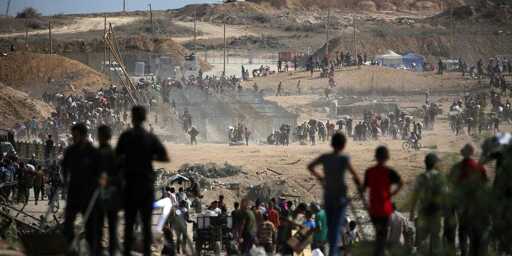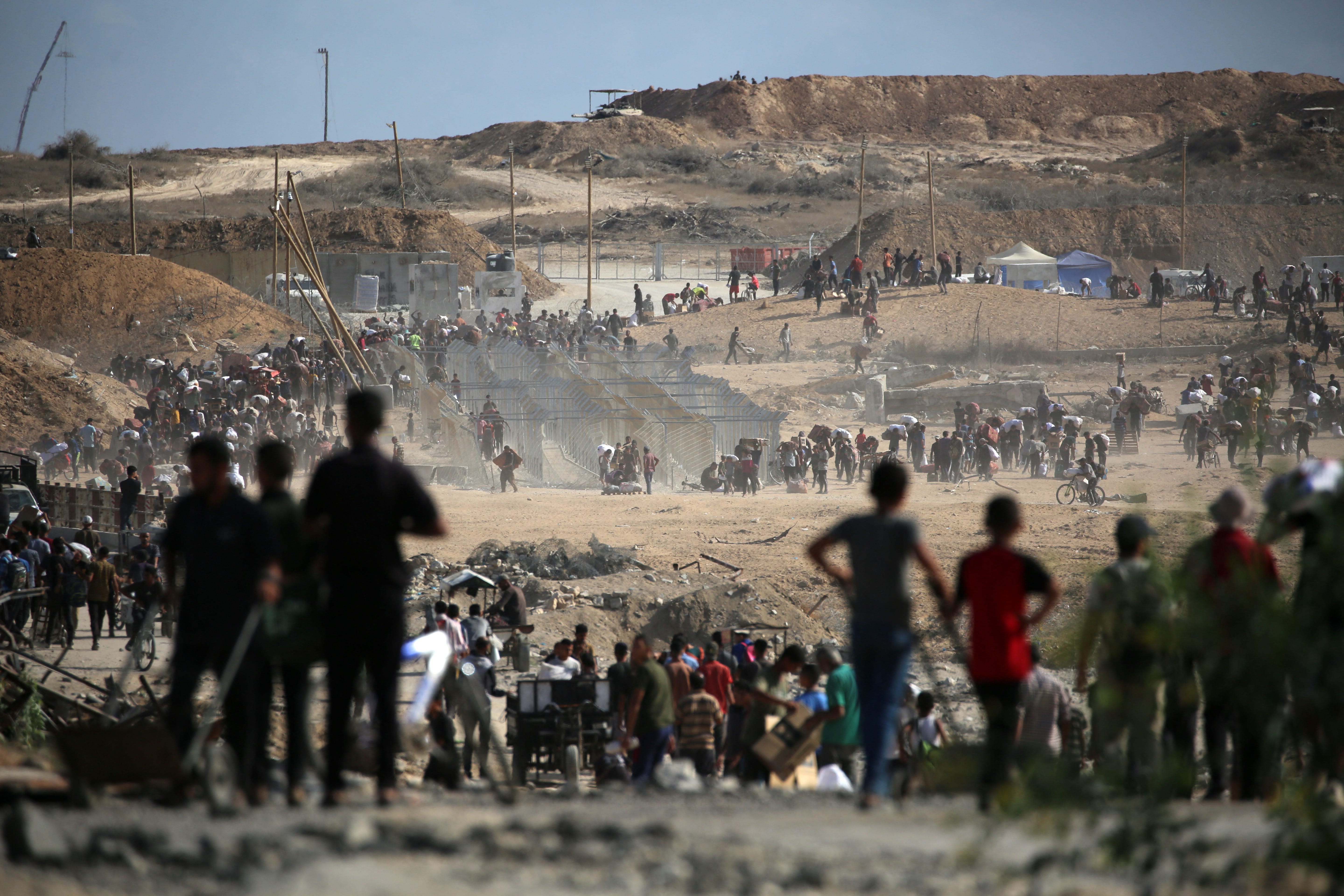We have a commitment to ensuring that our journalism is not locked behind a paywall. But the only way we can sustain this is through the voluntary support of our community of readers. If you are a free subscriber and you support our work, please consider upgrading to a paid subscription or gifting one to a friend or family member. You can also make a 501©(3) tax-deductible donation to support our work. If you do not have the means to support our work financially, you can do your part by sharing our work on social media and by forwarding this email to your network of contacts.
Palestinians carrying bags return from a food distribution point run by the Gaza Humanitarian Foundation near the Netzarim corridor in the central Gaza Strip on October 5, 2025.
UG Solutions, a leading U.S. military subcontractor that provided security for the Gaza Humanitarian Foundation (GHF), is stepping up its recruitment efforts amid possible plans for several aid distribution sites to be set up in Gaza by next month, Drop Site has learned.
A former army infantry officer who applied for a position as an “International Humanitarian Security Officer” at UG Solutions told Drop Site that a company official told him in an October 30th job interview that 12 to 15 sites were being planned to open in Gaza and that the company was “going to need a lot more guys.” The former army officer spoke to Drop Site on condition of anonymity, citing security concerns.
The future of Gaza is at a critical juncture following this week’s Security Council vote to approve a U.S.-sponsored resolution authorizing an international stabilization force in Gaza, which would not fall under the command of the UN, but rather a so-called Board of Peace chaired by President Donald Trump. This committee would have sweeping authority over Gaza, including overseeing reconstruction, security, economic recovery, and coordinating the distribution of humanitarian aid.
The use of private military contractors in aid distribution in Gaza first began in May with GHF opening four distribution sites in Gaza guarded by security contractors, many of whom were U.S. military veterans recruited by UG Solutions. For the four and half months that GHF operated in Gaza, more than 2,600 Palestinians seeking food were killed and over 19,000 wounded by Israeli forces or security contractors at or near aid distribution sites. The sites were dismantled after a U.S.-brokered “ceasefire” agreement went into effect in Gaza on October 10.
The UG Solutions official who conducted the phone interview, Joel Reyes, told the former infantry officer that deployment to Gaza was expected by early to mid December with deployments lasting 90 days. The officer was told the salary would be $800 per day for a “static guard” and $1,000 per day for “mobile guard” duty, plus a $180 per diem. When asked what the job entailed, Reyes told the recruit it was “pulling security.”
In response to inquiries about whether the claims of new aid sites in Gaza with a planned deployment for December were accurate, UG Solutions senior vice president of government affairs Jennifer Counter told Drop Site in an email that “UG Solutions is preparing for a wide range of potential scenarios in Gaza, ranging from an advisory role based on our experience from January 2025 to the present day, to a robust security presence in support of humanitarian aid delivery and possible technical assistance to the International Security Force.”
There are other indications of ramped up U.S. presence being planned in Gaza. On September 25, just one day after the $30 million GHF contract officially ended, a new U.S. contract with a company called Q2IMPACT was initiated, amounting to $7 million over five years to “monitor the efficacy of humanitarian aid in Palestine and Lebanon.” Rob Jenkins, the former head of USAID’s Office of Transition Initiatives, and Sean Jones, a former USAID mission manager to Egypt, are senior advisers, according to Q2’s press releases.
The former army officer first submitted an application to UG Solutions in June. Patrick Shoaff, a former Special Forces Green Beret who is the Director of Mission Support and Integration at UG Solutions, responded in an email in late July saying the former officer’s candidacy had moved forward in the recruitment process. The former officer did not hear from UG Solutions again until the October 30th phone call from Reyes. Four days after that call, the officer received an email from UG Solutions saying he was “prequalified for consideration in an upcoming overseas operation” in “a high-threat environment” and that a second interview would be scheduled.
During the second interview on November 4, another UG Solutions official questioned the officer in more detail about his military background and deployments, and asked him to give an example of “an ethical dilemma” he faced during his military service, the officer recalled. The UG Solutions official, whose name the officer declined to disclose, said that, if accepted, there would be three to four days of training at a facility in New Bern, North Carolina. This would include training in “rules of escalation” and “humanitarian aid operations,” in addition to shooting examinations and other courses. The UG Solutions official asked if the officer would be willing to take orders from someone more junior in military rank. He also said they were looking for recruits willing to work on a long term basis for the company.
On November 17, the officer received an email from Reyes rejecting his application and informing him that the company had “received many applications for this role and the search has been very competitive.” Reyes refused to comment when contacted several times by Drop Site.
The role of GHF and private military contractors in any future aid distribution in Gaza has been highly contentious. In late August, as ceasefire negotiations were underway and Israel’s genocidal military assault was in full force, Hamas agreed to remove language that would have prevented the GHF from remaining in Gaza after the agreement went into effect in what was seen as one of several major concessions.
In response to inquiries about whether UG Solutions was in discussions about guarding aid sites in Gaza in the coming period, Counter said: “We are prepared to provide security services to humanitarian aid sites in Gaza should the Board of Peace determine that distribution locations or storage areas need our skills and expertise,” in a reference to the Trump-led body to oversee Gaza that was authorized by the Security Council resolution this week.
“UG Solutions is in on-going discussions with relevant stakeholders about the situation on the ground in Gaza, our experiences there, and ways that we can again assist the humanitarian aid system and distributions,” Counter said. “The passage of the U.S.-led U.N. Security Council resolution on 17 November 2025 will likely help bring clarity to next steps in Gaza and UG is prepared to respond rapidly should our services be requested.”
Shortly after GHF operations began in Gaza in May, UG Solutions was quickly thrust into the spotlight over its conduct. In July, videos and accounts from two UG Solutions guards obtained by the Associated Press revealed that company subcontractors were firing live ammunition, stun grenades, and other weapons at nearly every distribution in Gaza, “even if there was no threat.” Later that month, Anthony Aguilar, a UG Solutions subcontractor who was deployed to Gaza, resigned over what he described as war crimes and crimes against humanity against Palestinians seeking food at GHF aid sites, which he called “death traps.” In August, several news outlets revealed UG Solutions had hired members of a U.S. biker gang with a history of anti-Muslim hate speech to serve as security guards in Gaza.
In response to whether UG Solutions was stepping up recruitment in preparation of another deployment to Gaza, Counter told Drop Site: “Our recruitment is ongoing for Gaza and several other international projects, most of which require the same skill set that we deployed to Gaza.” She added, “Many members of our team who have spent the better part of 2025 in Gaza are eager to return to the Strip because they believe in the humanitarian mission there, built relationships with members of the community, and wish to help those suffering from the effects of war.”
Last month, the North Carolina chapter Council on American-Islamic Relations (CAIR-NC), along with other local groups, called on the North Carolina secretary of state and the state attorney general to investigate UG Solutions, which is based in Davidson, North Carolina, for its actions in Gaza. “Companies incorporated in North Carolina must not be complicit in war crimes or human rights abuses abroad,” Al Rieder, the manager of CAIR-NC, said in a statement. “The evidence that a North Carolina-based company allegedly participated in attacks on starving civilians in Gaza is horrifying. We are urging the state’s top officials to uphold the law and ensure that North Carolina is not used as a base for operations that contribute to the suffering of innocent people.”
Since the ceasefire went into effect on October 10, Israel has violated the deal by continuing to attack Gaza, killing at least 290 Palestinians, and by not allowing the agreed upon 600 aid trucks per day into Gaza—what the United Nations has said in the past is the bare minimum amount needed. In August, the world’s leading expert on food crises, the Integrated Food Security Phase Classification, declared a famine in Gaza. Over 450 Palestinians, including over 150 children, have died of starvation and malnutrition in Gaza between October 2023 and the end of September, according to the Gaza health ministry.
Alexandra Hall with Adalah Justice Project and Jack Poulson contributed to this report.
From Drop Site News via this RSS feed



